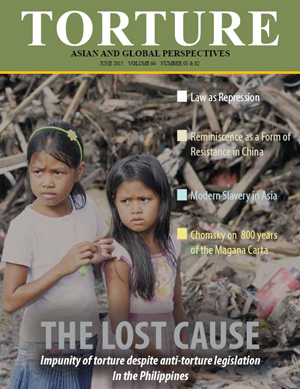
 (Hong Kong, August 21, 2015) What can we do when repression is legal? This question is asked by social activists across the world, fighting against their repressive nations. Concern for the shrinking spaces for civil society and the challenges faced by those working against repression at the grassroots level are explored by Erik Wendt and Morten Koch Anderson, of the Danish Institute Against Torture, in their latest piece.
(Hong Kong, August 21, 2015) What can we do when repression is legal? This question is asked by social activists across the world, fighting against their repressive nations. Concern for the shrinking spaces for civil society and the challenges faced by those working against repression at the grassroots level are explored by Erik Wendt and Morten Koch Anderson, of the Danish Institute Against Torture, in their latest piece.
Erik Wendt is the Asia Programme Manager for DIGNITY, while Morten Koch Andersen has worked for DIGNITY since 2006 as Programme Manager for the Prevention of Violence and Rehabilitation of Torture Survivors.
“It is alarming when organisations which are well-known for their accountability and credibility are stopped from performing their legitimate work to monitor and publicise violations, be they environmental issues or human rights, by the active engineering and application of new legal frameworks,” they observe.
“The latest passing of the anti-NGO law in Russia is yet another example of the shrinking political space for civil society, divergent views and voices. Russia is not alone in this move to contain critical national organisations and voices, curtail external partners and international non-governmental organisations. In recent years we have seen how governments across the globe have become increasingly suspicious and repressive towards the funding of civil society organisations, especially foreign funding of rights-based organisations. Governments in Russia, China, India, Bangladesh, Pakistan, Egypt, Kenya, Ethiopia, Rwanda, Uganda, Israel and many more are step by step prohibiting civil society from engaging in documentation, assistance and advocacy work that critique state and government laws, policies and practices.”
“In this situation, state agencies, notably law enforcement agencies, become the prime monitoring body of transgressions. Courts become the battlefield of legal interpretations and adjurations which halt the work of individuals and organisations, stall criticism and negate political voices.”
The full text of the article will be available in the latest issue of the magazine.
The forthcoming issue also contains an interview with Marjorie Cohn, Professor of Law at the Thomas Jefferson School of Law, San Diego California, and an article by Noam Chomsky who is Institute Professor in the Department of Linguistics and Philosophy at the Massachusetts Institute of Technology, Boston. Tisaranee Gunasekara, Ron Jacobs, Binoy Kampmark and Ahlam Chemlali contribute their regular columns.
“Notes from History” this issue is filled with the sage thoughts expressed by the late Jose W. Diokno who bravely fought against the authoritarian Marcos regime in the Philippines. Jose W. Diokno was one of conveners of the Asian Human Rights Commission, found in 1984.
Torture: Asian and Global Perspectives is a bi-monthly magazine which focuses on torture and its related issues globally. Writers interested in having their thoughts and research on this subject published, may submit their articles to torturemag@ahrc.asia
To support this case, please click here: SEND APPEAL LETTER
SAMPLE LETTER